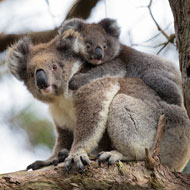Cars and chlamydia named as top koala threats

Chlamydia was particularly devastating as it can render females infertile and causes bladder and eye infections.
Road accidents and chlamydia are the top causes of death in south-east Queensland koalas, according to new research.
Researchers from the University of Queensland worked with the government’s Moggill Koala Hospital to analyse data on koala disease and death from 1997 to 2013, the period spanning the koala population crash.
At least a quarter of the koalas to be hit by cars during this time were otherwise healthy, according to the research team.
Around half of the population that died during the study period were affected by more than one disease or health issue, including trauma. Chlamydia was particularly devastating as it can render females infertile and causes bladder and eye infections, making it more difficult to forage and avoid predators.
Other key causes of koala deaths were animal attacks - particularly by dogs - starvation, disease and poor teeth.
The research team has developed KoalaBASE, a web-based database that provides information on koalas coming into care facilities in south-east Queensland. Study author Dr Joerg Henning said it allows data input from multiple veterinary centres. Data can also be used by numerous stakeholders such as veterinary surgeons, government departments and researchers.
Researchers hope their findings, which are published in Scientific Reports, will help government agencies, koala groups and hospitals to better target resources.



 The veterinary mental health charity Vetlife is inviting the veterinary community to join it for a sponsored cold-water dip.
The veterinary mental health charity Vetlife is inviting the veterinary community to join it for a sponsored cold-water dip.